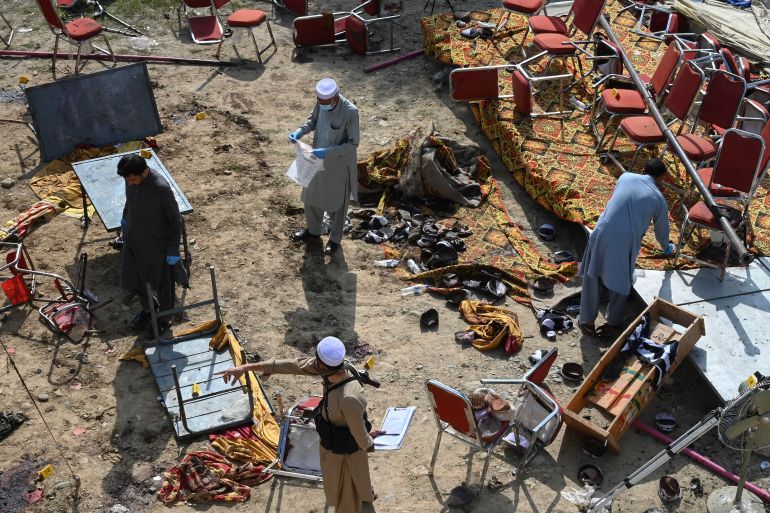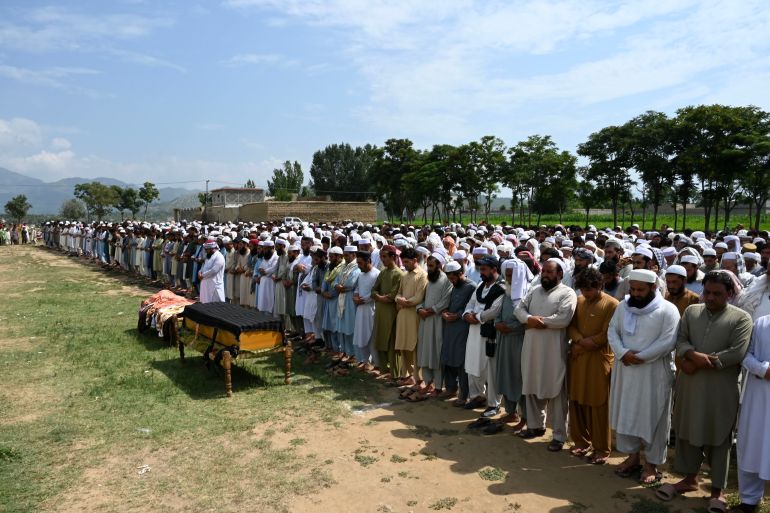Al Jazeera
Armed group attacks in Pakistan have increased by 79 percent during the first half of this year, a research group says.

The deadly July suicide bombing at a political rally in Pakistan’s northwestern province of Khyber Pakhtunkhwa highlights a troublesome trend of violence in the region.
The bombing on Sunday targeted those attending a rally for the religious political party Jamiat Uleme-e-Islam-Fazal (JUIF) in the tribal district of Bajaur, some 130km (80 miles) from Peshawar, the provincial capital.
At least 54 people were killed and 200 were injured in the attack, making July the second most deadly month in Pakistan this year, according to the Pakistan Institute for Conflict and Security Studies (PICSS), an Islamabad-based research organisation.
Shortly afterwards, ISIL (ISIS) claimed responsibility for this attack, which according to researcher Ricardo Valle, fits with the “long history” of enmity between the Islamic State in Khorasan Province, ISKP (ISIS-K), the regional affiliate of ISIL, and Bajaur’s JUIF that dates back to at least 2019.
“In IS-K’s [ISIS-K’s] eyes, the JUIF supports democracy, believes in a republican system instead of an Islamic one, and believes in national states instead of the Ummah,” said Valle, director of research for The Khorasan Diary, a non-partisan research platform.
“Furthermore, IS-K believes that JUIF is the political arm of the Afghan Taliban in Pakistan, considering them close allies,” the Islamabad-based scholar told Al Jazeera on Tuesday.
Valle said IS-K issued a series of fatwas (Islamic rulings) last year, calling for the assassinations of JUIF religious scholars and activists.
“There are multiple motives at play here. IS-K is driven by the logic of outbidding in the competitive militant landscape of the region. The group asserts itself through large-scale attacks,” he told Al Jazeera.
Mir, however, adds that perhaps actions against JUIF were also driven by their support for the Afghan Taliban’s operations against IS-K.
Regardless of the reasons, the bombing in Bajaur is just the latest in an increasing trend of violent incidents this year.
Most attacks occurred in the country’s Khyber Pakhtunkhwa province and its tribal districts. It is followed by incidents in the southwestern province of Balochistan, where a nationalist armed campaign has been continuing for years.
More than 100 people were killed in January this year when a suicide bomber targeted a mosque in Peshawar’s police lines area. February saw armed fighters target a key police office in the southern city of Karachi in an attack that lasted for hours and killed at least five people. Another large-scale attack unfolded in the Swat area of Khyber Pakhtunkhwa in April when attackers targeted a counterterrorism office, which resulted in the death of 17 people.
TTP and IS-K at ‘loggerheads’
Sunday’s attack on the JUIF’s political rally raised the question of whether Pakistan will yet again witness pre-poll violence, which was seen in previous election years.
Pakistan is scheduled to hold general elections later this year and has a history of violence in which political figures have been targeted.
Since the Afghan Taliban took over Kabul in August 2021, the TTP has focused its attacks on Pakistan’s law enforcement agencies and their personnel and has carried out numerous attacks of varying sizes.
In a recent statement, the group claimed it conducted 98 attacks of various intensities in July alone.
However, despite having the same ambition to establish an Islamic emirate in Pakistan’s tribal belt as ISIS-K, the two groups are at loggerheads.
Valle, the researcher, said that the groups stand at opposite ends of the spectrum in terms of their allegiance and hostility towards the Afghan Taliban and regional agenda.
“We saw that the TTP not only immediately distanced itself from the Bajaur attack but also accused IS-K of being proxies of Pakistan’s establishment,” he told Al Jazeera.
Syed Akhtar Ali Shah, a former police chief in the Khyber Pakhtunkhwa province, said that the ISIS-K is driven by the ideology of the parent organisation ISIL, which is to create an “Islamic caliphate” all over the world.
“They have a transnational ideology. They use a term ‘takfeer’, which means anybody who deviates from the path. So according to ISIL, any person, even if they are followers of Islam, they are liable to be killed if they side with infidels. And to ISIL, JUIF and the Taliban are all infidels,” the former police chief told Al Jazeera.
Shah added that the new TTP chief, Noor Wali Mehsud, has made it clear that the group will only target security personnel and is often quick to condemn ISIS-K activities.
“It is a tactical decision by them to not target the general public, but also quickly, and categorically condemn acts of violence by the IS-K. Their ideological brothers in Afghanistan, the Taliban there are also doing their best to eliminate IS-K,” he said.
Mir, the scholar at the USIP, said that the uptick in violence is part of the country’s overall deteriorating security landscape and is not linked to elections.
“The violence seems to be a gradual escalation and not driven by the looming election. Most of the violence is being carried out by the TTP, which benefitted from the Taliban takeover and ever since has a permissive haven in Afghanistan,” he said.
The Pakistani government has conducted multiple meetings with its Afghan counterparts, whom they claim are not doing enough to control the movement of TTP fighters across the two countries’ porous borders.
A high-level delegation visited Kabul earlier this year. In May, Afghan Foreign Minister Mawlawi Amir Khan Muttaqi visited Pakistan for two days, but violent attacks seem to have increased despite the dialogue.

Political instability
The decline in law and order comes as Pakistan faces continuing political turmoil, with the ruling alliance of the Pakistan Democratic Movement and the country’s powerful military establishment unleashing a crackdown against former Prime Minister Imran Khan and his party, Pakistan Tehreek-e-Insaf.
The country’s economy is also perilously placed, and it only recently received a $3bn loan from the International Monetary Fund in July, staving off a near-certain default.
“Factions of TTP, as well as IS-K, will take advantage of the unstable political situation for carrying out more attacks against security forces,” he said.
Shah, who also served as a provincial secretary for home affairs in the Khyber Pakhtunkhwa government, said that the fallout of a weak government that cannot establish itself is visible in the current security climate of the country.
“It is only a coincidence that we have elections this year, but the violence has only been increasing and this is not a new crisis. The state has the law, the policies, the framework. But it needs the will to enact these in letter and spirit,” he said.
